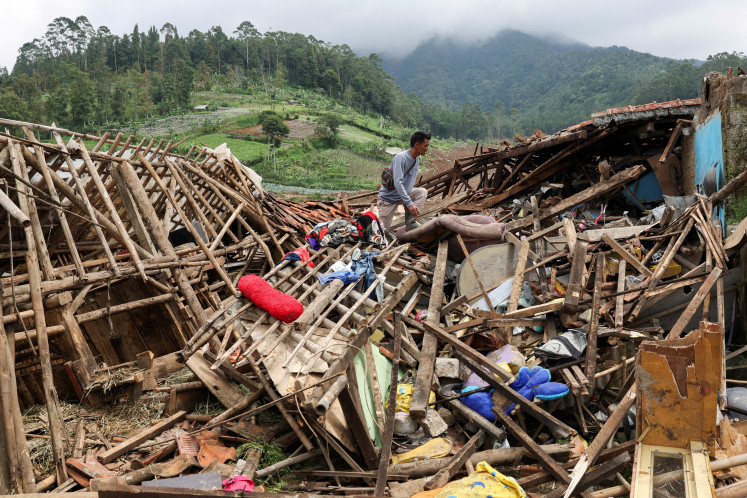Popular Reads
Top Results
Can't find what you're looking for?
View all search resultsPopular Reads
Top Results
Can't find what you're looking for?
View all search resultsPLN warns of another crisis in coal supply
Domestic stocks declining amid high global prices.
Change text size
Gift Premium Articles
to Anyone
T
he government is being urged to quickly implement the coal public services agency (BLU) and tighten rules on domestic coal sales amid concern that the country is heading toward another domestic coal-supply crisis.
State-owned electricity monopoly PLN reported a declining inventory in the last three months due to a wide gap between capped domestic prices and the prices paid by offshore buyers.
PLN president director Darmawan Prasodjo said that, although the company’s coal inventory was above the secure level of 4.5 million tons in the February-June period, supplies were declining faster as power demand rose beyond expectations.
As a result, PLN needed to secure an additional 7.7 million tons of coal to anticipate a 5.3 terawatt-hour (TWh) increase in electricity demand as the country’s economic recovery continues.
“[PLN] noted a downtrend in coal supply amid increasing electricity demand. If there’s [no improvement] in the current situation, we may face another [coal] crisis,” he told House of Representatives Commission VII overseeing energy and mineral resources in a hearing in Jakarta on Tuesday.
The commission met during recess on Tuesday, fearing the country, the world’s biggest thermal coal exporter, was headed for a repeat of a domestic supply crisis late last year that saw exports banned for a few weeks in January, triggering panic among foreign buyers.
PLN data show that its coal supply in January – the beginning of the crisis-recovery period – amounted to 4.4 million tons, before it significantly increased to 5.68 million tons and 5.69 million tons in February and March, respectively.
But the company’s coal stockpiles continued to slowly decline in the last three months – dwindling to 5.64 million tons, 5.46 million tons and 5.11 million tons in the April-June period – despite being at a higher stock level compared with the same period last year, which only appeared stagnant at around 2.7 million tons.
The Energy and Mineral Resources Ministry has assigned an additional supply of 31.8 million tons from January to this month, but only 14.3 million tons, or 45 percent, of the assigned amount has been realized.
Read also: Govt mulls plan to form new entity to collect coal levies
Adi Priyanto, PLN's regional business director for Sulawesi, Maluku, Papua and Nusa Tenggara, said on Wednesday that PLN had secured enough coal to meet its power generation needs, explaining that the company had secured 15 days' worth of feedstock for its coal-fired power plants across Indonesia.
Adi did not rule out a potential shortage, but expressed confidence that the energy ministry would prevent something like that, given that the government was currently forming the BLU.
"[PLN] hopes the BLU will be established by the end of August," he said.
Price disparity
Energy Minister Arifin Tasrif acknowledged that there were risks of local supply issues due to the wide gap between capped domestic prices and the prices paid by offshore buyers.
“There is a tendency to avoid contracts with domestic industries,” Arifin said in the same hearing.
Sapto Aji Nugroho, PLN executive vice president for coal, said on Aug. 2 that coal miners whose contracts had expired were reluctant to renew their contracts due to the large price gap.
Furthermore, no new miners are willing to make supply contracts with the company, he added, without providing further details.
In the first half of the year, the government collected Rp 1.83 trillion (US$128 million) in fines from 240 mining companies that failed to comply with their domestic market obligation (DMO) for coal.
A number of miners opted to pay the fine and export a greater portion of their coal production at higher world prices, instead of selling it for domestic use. The Finance Ministry projected that the total fines could reach Rp 2.37 trillion by the end of the year.
Indonesia's coal benchmark price (HBA) has stayed above $70 per ton since January 2021 but surged to a record $321.59 per ton this month, as the war in Ukraine exacerbated the energy supply crunch.
Read also: Govt fines 240 miners for failure to meet coal DMO
Meanwhile, legislators on Tuesday pressed the government to tighten rules on domestic coal sales as concern grows that miners would choose to pay fines instead of meeting a requirement to sell a quarter of their output to local power generators.
Lawmakers urged authorities to review the size of fines imposed for failing to meet the DMO and push ahead with the BLU implementation to collect coal levies, which would then be used to subsidize PLN's coal purchases so that producers could receive market prices.
“We need to review why businesses would rather pay fines than meet their obligation, there must be something wrong here,” said legislator Diah Nurwitasari.
PLN’s declining inventory was a warning sign for the government to act fast, said lawmaker Dony Maryadi Oekon.
Hendra Sinadia, executive director of the Indonesian Coal Mining Association (APBI), added that while the BLU was expected to solve PLN’s coal supply problems, the government needed to ensure the agency prioritized transparency in carrying out its operations.
“[Coal mining companies] need the BLU to be ready to provide an effective pricing mechanism and other technical guidance. If possible, there needs to be no trial and error [upon implementation] because it is [closely related to] cash flow,” he told The Jakarta Post on Tuesday.










